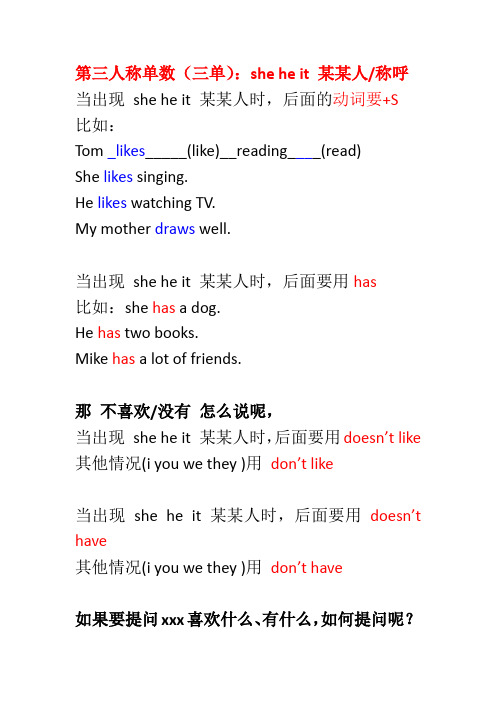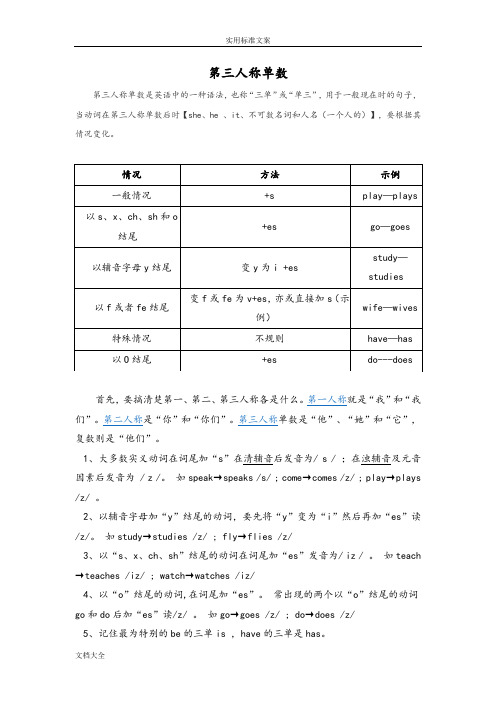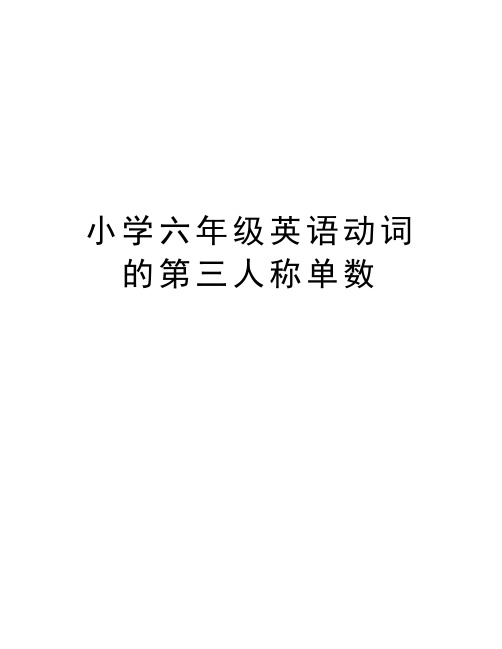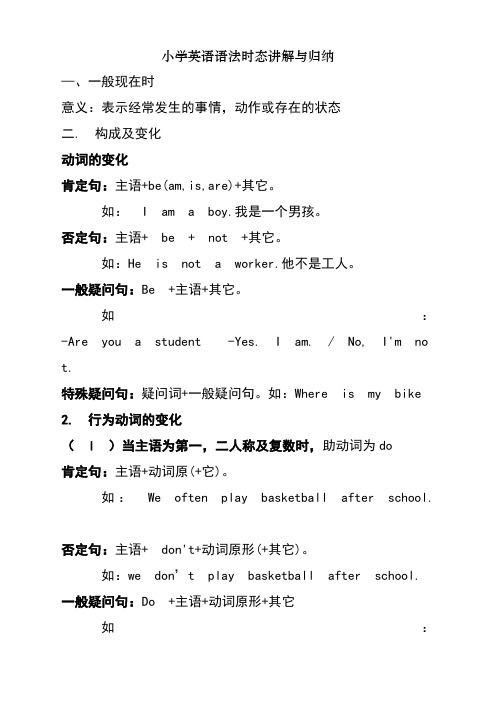小学英语语法课件-哪些主语是第三人称单数讲解
小学英语语法:第三人称单数

第三人称单数(三单):she he it 某某人/称呼当出现she he it 某某人时,后面的动词要+S比如:Tom _likes_____(like)__reading____(read)She likes singing.He likes watching TV.My mother draws well.当出现she he it 某某人时,后面要用has比如:she has a dog.He has two books.Mike has a lot of friends.那不喜欢/没有怎么说呢,当出现she he it 某某人时,后面要用doesn’t like 其他情况(i you we they )用don’t like当出现she he it 某某人时,后面要用doesn’t have其他情况(i you we they )用don’t have如果要提问xxx喜欢什么、有什么,如何提问呢?当出现she he it 某某人时,提问要用What does xxx like xx ing?其他情况(i you we they )用What do xxx like xx ing?当出现she he it 某某人时,提问要用What does xxx have?其他情况(i you we they )用What do xxx have?注意: do does don’t doesn’t后面用动词原形比如:don’t haveDoesn’t likeWhat does she have?(也就是疑问句、否定句中,无论主语是不是三单,后面都用原形注意: like后面紧跟ing形式比如like swimmingLike singingLike dancingLike drawing。
英语“三单形式”详解

第三人称单数[注意]a、下面两个动词变三单时,原词的元音部分的发音发生了较大的变化,要记忆。
如do/du:/ →does/dʌz/ ; say/sei/ → says /sez/ 。
b、以不发音字母“e”结尾的开音节词,如果尾音是[s][z]时加“s”后字母“e”发音与所加“s”一起读做[iz]。
如: close→closes [iz]。
在中文中第三人称单数的三个“他”写法不一样,读音却相同。
但在英语中,三个“他”既有不同的读音,也有不同的写法,分别是he, she, it。
在第三人称后不能使用动词的原形,而要在相应的动词后加s或es。
简单地讲,一个人就是单数,多于一个人就是复数。
在咱们汉语里,第三人称复数也就是常说的“他们”或者“她们”,英语中就是they.而“第三人称单数”就是指的“他”或者“她”,在英语中,相对应的就是he 或者she句子举例:第三人称单数: He is a student. (他是学生)第三人称复数: They are students.(他们是学生)以上只是一种帮助你理解的简单回答,第三人称还包括一些其他的方面,比如“it”等,这里就不多说了,希望你在学习中多多体会。
在一般现在时中,当主语是第三人称单数时,谓语动词要用第三人称单数形式,即常在动词原形后加-s或-es。
下面归纳一下第三人称单数的用法:一、人称代词he, she, it是第三人称单数。
如:He likes watching TV. 他喜欢看电视。
She has lunch at twelve. 她十二点吃午餐。
It looks like a cat. 它看起来像只猫。
二、单个人名、地名或称呼作主语;是第三人称单数。
如:①Han Mei looks like her mother. 韩梅看起来像她的母亲。
②Beijing is in China. 北京在中国。
③Uncle Wang often makes cakes. 王叔叔经常做蛋糕。
小学六年级英语动词的第三人称单数知识讲解

小学六年级英语动词的第三人称单数小学英语语法:“第三人称单数”第三人称有“他、她、它以及一些单数名词”。
当主语是第三人称单数时,谓语动词要用第三人称单数形式,即常在动词原形后加-s或-es。
一、动词第三人称单数的变化规则及发音规律动词原形变第三人称单数的规则与发音规律同名词单数变复数大致相同,请认真观察。
1、大多数动词在词尾加“S”如:stop-stops [s] ; make-makes [s] read-reads [z] ; play-plays [z]2、以辅音字母加“y”结尾的,要先将“y”变为“i”,然后在加“es”读[iz] 如:fly-flies [z]; carry-carries [z] study-studies [z]; worry-worries3、以“s, x, ch, sh”结尾的,在词尾加“es”,发音为[iz] 如:teach-teaches [iz]; watch-watches [iz]4、以“o”结尾的动词,加“es”,如:go-goes [z] do-does [z]注:下面几个动词变为单数时,原词的元音部分的发音发生了较大的变化,请注意记忆。
如:do [du:]-does [dz] say [sei]-says [sez]以不发音字母“e”结尾的开音节词,如果尾音是[s],[z]时,加“s”后字母“e”发音,与所加“s”一起读做[iz]。
如:close-closes [iz]一、第三人称代词 he, she, it 做主语时。
例如:She is very good at English. 她英语学得好。
He studies in a middle school. 他在一所中学学习。
He likes watching TV. 他喜欢看电视。
She has lunch at twelve. 她十二点吃午餐。
He can play football. 他会踢足球。
人称代词物主代词和第三人称单数的讲解以及练习

人称代词和物主代词一、人称代词表示“我”、“你”、“他”、“她”、“它”、“我们”、“你们”、“他们”的词,叫做人称代词。
人称代词有人称、数和格的变化,见下表:(1)人称代词主格:作主语,表示谁怎么样了、干什么了。
如:I am a teacher. You are student. He is a student, too. We / You / They are students.(2)人称代词宾格作宾语,表示动作行为的对象。
如:Give it to me. Let’s go (let’s =let us)二、物主代词表示所有关系的代词叫做物主代词,也可叫做代词所有格。
物主代词分形容词性物主代词和名词性物主代词二种,其人称和数的变化见下表。
(1) 形容词性物主代词( my / your / his / her / its / our / their )+名词。
如:her book my teacher his bike(2)名词性物主代词则相当于“形容词性物主代词+名词”,故其后不必加名词。
如:Is this your book?No,,it isn’t, it’s hers(her book)人称单数复数主格宾格 主格 宾格 第一人称 I me we us 第二人称you you youyou第三人称hehim theythemshe her itit 数、人称、类别单 数复 数第一人称第二人称第三人称 第一人称 第二人称 第三人称 形容词性物主代词 myyourhisheritsouryourtheir名词性物主代词mineyourshishersitsoursyourstheirsThis pen is mine.人称代词与物主代词用法的练习题一、填表二、填空:1.Let _____ (I) help ____ (you).2.Let _____ (we) go.3.(I) _____ are students.4.I can't find _____ (they).5.Give ____ (he) the book. 三、选择1.________are in the same class.A.Her and meB.She and lC.Me and herD.l and she 2.Please call ___ at 256-5896 A me B my C I D mine 3.-Do you like these computers? -No,I don't like_______. A it B them C they5.Our tercher think_______are right. A.We C it D she6.______go to the party.A.He,I and youB.I, you and heC.You,I and heD.You,he and I 四、用括号中的适当形式填空: (1)Are these ________(you )pencils?Yes, they are ________(our ).人称单数复数主格宾格 主格 宾格 第一人称 I we 第二人称you youyou第三人称him theyshe it(2)—Whose is this pencil?—It’s ________(I).(3)I love ________(they)very much.(4)She is________(I)classmate.五、代词练习:A. 写出各个代词的对应项。
小学六年级英语动词的第三人称单数

小学英语语法:“第三人称单数”第三人称有“他、她、它以及一些单数名词”。
当主语是第三人称单数时,谓语动 词要用第三人称单数形式,即常在动词原形后加-s 或-es 。
一、动词第三人称单数的变化规则及发音规律动词原形变第三人称单数的规则与发音规律同名词单数变复数大致相同,请认真 观察。
1、 大多数动词在词尾加“ S ”如: stop — stops [s] ; make — makes [s] read — reads [z] ; play — plays [z]2、 以辅音字母加“ y ”结尾的,要先将“ y ”变为“ i ”,然后在加“ es ”读[iz]女口:fly — flies [z] ; carry — carries [z] study — studies [z]; worry —worries3、 以“s, x, ch, sh ”结尾的,在词尾加“ es ”,发音为[iz]女口:teach — teaches [iz]; watch — watches [iz]4、 以“o ”结尾的动词,加“ es ”,女口:go — goes [z] do — does [z]注:下面几个动词变为单数时,原词的元音部分的发音发生了较大的变化,请注意记忆。
女口: do [du:] — does [dz] say [sei] — says [sez]以不发音字母“ e ”结尾的开音节词,如果尾音是[s],[z]时,加“ s ”后字母“ e ” 发音,与所加“ s ” 一起读做[iz]。
女口: close — closes [iz]、第三人称代词he, she, it 做主语时。
例如:She is very good at En glish. 她英语学得好。
He studies in a middle school. 他在一所中学学习。
He likes watchi ng TV. 他喜欢看电视。
She has lunch at twelve. 她十二点吃午餐。
小学英语语法复习PPT课件

小学英语语法
写出下列各词的复数
I _____him ______ this _______ her _____ watch ___ child ____photo ______diary _____ day______ foot_____ book_____ dress ____ tooth____ sheep ____ box_____ strawberry __ thief _____you _____ peach___ sandwich ___ man_____ woman___ paper_____ juice_____ water_____ milk______ rice______ tea______
小学英语语法
一般将来时
一、概念:表示将要发生的动作或存在的状态及 打算、 计划或预备做某事。句中一般有以下时间状语:tomorro w, next day (week, month, year…),soon, the day after tomorrow(后天)等。 二、基本结构:①be going to do;②will do. 三、否定句:在be动词(am, is, are)l后加not或情态动 词will后加not成won’t。 例如:I’m going to have a picnic this afternoon.→ I’m not going to have a picnic this afternoon. 四、一般疑问句: be或will提到句首,some改为any, an d改为or,第一二人称互换。 例如:We are going to go on an outing this weekend. → Are you going to go on an outing this weekend
小学英语动词的第三人称单数四年级

06 小学英语动词第三人称单数在实际交流中的运用
xx
PART ONE
添加章节标题
xx
PART TWO
小学英语动词第 三人称单数的概 念
定义和作用
添加标题
定义:小学英语动词第三人称 单数是指动词在第三人称单数 主语后的形式,通常在动词后 加“-s”或“-es”。
添加标题
作用:第三人称单数用于表示 单数的主语,如he/she/it等, 强调主语和谓语之间的单数关 系。
模仿外教:Practice saying "She teaches English"
请教外教:How do you say "They play basketball" in English?
与外教交流:Use the third person singular form of the verb when speaking with a native Englis h speaker.
xx
P小A学R英T 语T动H词R第E E
三人称单数在四 年级教材中的应 用
教材中的例句
She watches TV in the evening.
He plays basketball ever y day.
He goes to school on foot.
She writes a letter to her friend.
备考策略
掌握动词第三人称单数的变化 规则
熟悉常见的动词第三人称单数 形式
多做练习题,提高应试能力
注重听、说、读、写全面发展
xx
PART FIVE
如何提高小学英 语动词第三人称 单数的应用能力
多听多说多练
一般现在时第三人称单数、疑问句

小学英语语法时态讲解与归纳—、一般现在时意义:表示经常发生的事情,动作或存在的状态二. 构成及变化动词的变化肯定句:主语+be(am,is,are)+其它。
如:I am a boy.我是一个男孩。
否定句:主语+ be + not +其它。
如:He is not a worker.他不是工人。
一般疑问句:Be +主语+其它。
如:-Are you a student -Yes. I am. / No, I'm no t.特殊疑问句:疑问词+一般疑问句。
如:Where is my bike 2. 行为动词的变化(l )当主语为第一,二人称及复数时,助动词为do肯定句:主语+动词原(+它)。
如:We often play basketball after school.否定句:主语+ don't+动词原形(+其它)。
如:we don’t play basketball after school. 一般疑问句:Do +主语+动词原形+其它如:Do you often play basketball after school lYes, we do. / No, we don't.特殊疑问句:疑问词+以do开头的一般疑问句如:What do you often do after school(2)当主语为第三人称单数时, 助动词为does肯定句:主语+动词三单式(+其它)。
如:He swims well.否定句:主语+ doesn’t+动词原形(+其它)。
如:He doesn’t swim well.一般疑问句:Does +主语+动词原形+其它。
如:Does he swim wellYes, he does. / No, he doesn't.特殊疑问句:疑问词+以does开头的一般疑问句如:How does your father go to work 三.第三人称单数的动词变化规则(只有在第三人称为主语的肯定句中,动词才用三单式)(1)多数动词直接加s:runs gets likes collets takes plays climbs…….(2)结尾是s, x, sh, ch, o,前为辅音字母, 结尾加es : watches teaches goes does washes cross esmixes brushes(3)动词末尾y前为辅音:将y改为i加es: study→studies fly→flies carry→carries cry→c ries但在y前如果为元音则直接加s: buys says四.时间标志:always , usually , often , sometimes ,every…一般现在时练习He often (have) dinner at home.Daniel and Tommy (be) in Class One.We (not watch) TV on Monday.Nick (not go) to the zoo on Sunday.they (like) the World Cup What they often (do) on Saturda ysyour parents (read) newspape rs every dayThe girl (teach) us English on Sunday s.She and I (take) a walk together every evening.There (be) some water in the bottle.Mike ____ (like) cooking.They ____ (have) the same hobby.My aunt ____(look) after her baby carefully.You always ______(do) your homework well.I (be) ill. I’m staying in bed.She (go) to school from Monday to Friday.Liu Tao _____ (do) not like PE.The child often _____ (watch) TV in the evening.Su Hai and Su Yang ____ (have) eight lessons this ter m.-What day ___ (be) it today-It’s SaturdayWinter, spring, summer and autumn (be)seasons.Danny (take) off his T-shirt now.Today (teach) a science lesson.Jenny and I (live) in Canada.Jenny (want) to go to school in chinaLet me (help) youShe eats a sandwich(总是)Li Ming goes to school by bicycle(有时)。
- 1、下载文档前请自行甄别文档内容的完整性,平台不提供额外的编辑、内容补充、找答案等附加服务。
- 2、"仅部分预览"的文档,不可在线预览部分如存在完整性等问题,可反馈申请退款(可完整预览的文档不适用该条件!)。
- 3、如文档侵犯您的权益,请联系客服反馈,我们会尽快为您处理(人工客服工作时间:9:00-18:30)。
Personal pronouns
人称代词
Third person singular第三人称单数
I \we you he\ she\ it\ they
he, she, it
Names名字 Appelations称呼
Third person singular第三人称单
Which subjects belongs to the third person singular?
哪些主语是第三人称单数?
1.What are the three main categories of the subjects? 主语大概可以分为哪三类? 2.What are the first \ second \ third person? 第一人称、第二人称、第三人称是什么?
主语
I/...?
Qiuqiu/...? Apples/...?
I/ Thisman/That lady/Qiuqiu/It/We/Beijing/Apples/You
主语
I/we/ou
he/she/it/they Qiuqiu Beijing
this man/that lady/apples
I/ Thisman/That lady/Qiuqiu/It/We/Beijing/Apples/You
可数名词/不可数
名词
uncountable nouns(不可数名词)
人称代词
可数名词
单数/不可
he, she, it
单个人名、
地名或称
数名词
第三人 称单数 主语
呼
第三人称单数
It Tom That car The milk
It is a lovely toy. They like watching TV. I am a teacher. Tom likes playing football. Tom andJack like playing football. Beijing and Hangzhou are pretty cities. That car is red. Those cars are red. The milk is in the glass.
“head”
subject主语
Hello,everyone! I am big head son. My head is very big. This man is my father. He is very tall. That lady is my mother. She often cooks delicious food for me. They are the best parents. Qiuqiu is my pet. It is very lovely.We are a happy family. Beijing is my favourite city. Apples are my favourite fruit. You can find me on TV!
数
Qiuqiu
Beijing Apples
A single person, place\address单个 人名、地名或称呼
Nouns名词
countable nouns 可数名词
uncountable nouns不可数名词
?
Nouns名词
Third person singular第三人称单数 singular countable nouns(可数名词单数)
Hello,everyone! I am big head son. My head is very big. This man is my father. He is very tall. That lady is my mother. She often cooks delicious food for me. They are the best parents. Qiuqiu is my pet. It is very lovely.We are a happy family. Beijing is my favourite city. Apples are my favourite fruit. You can find me on TV!
主语
人称代词 称呼、名字
Qiuqiu Beijing
名
词
he/she/you...
That lady...
第一人称
• I我
第二人称
第三人称
• you
• We 我们
• 你;你们
•?
第一人称
第二人称
第三人称
• you
Personal pronouns Names/Appelations Nouns
